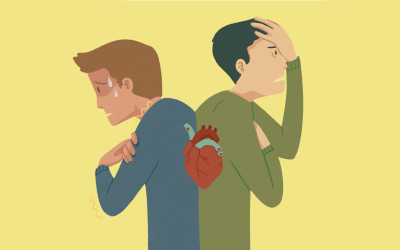
Anxiety and Anger: Exploring the Connection
Are Anxiety and Anger related?
The feelings of anxiety and anger are distinct but closely related. While one feeling can stem from the other, the link between the two is often missed or exaggerated.
What is Anger?
Anger is an emotion characterized by dissent towards someone that we feel is responsible for our agony. When things that have happened in the past don’t turn out to be our way, we feel angry. Anger causes anxiety by inducing a feeling of stress in our mind and body.
If we express anger in a destructive way, it can ruin relationships, hamper our professional growth, or even lead to substance abuse. When we constructively channel our emotions of anger, it can help express ourselves and provide an individual an opportunity to rectify his wrongdoings.
What is anxiety?
Anxiety is an emotion characterized by physical tension and worried thoughts when one loses control over emotions and the things happening in the surroundings. It is most often regarding the stuff of the future that has not occurred yet. Often it is at the pretext of feelings and emotions like shame and guilt – the things that are a matter of our self-esteem.
While too much anxiety can be prostrating, it can help address our concerns and impart physical and emotional well-being when used constructively.
How are these two connected?

Anxiety and anger share a lot of common ground. Both these emotions lead to physical changes like the release of stress hormones inside the body. Our thoughts and feelings trigger both these emotions, and our thought patterns can help improve or worsen these.
Now the question arises how anxiety and anger interact as human emotions. Let’s see:
Both show similar physical symptoms.
When angry or anxious, your body secretes hormones, including cortisol and adrenaline, that prepare the body to fight or flee.
The physical symptoms of being angry or anxious includes:
- Sweating of palms and feets
- The heart starts to pound rapidly.
- Muscle spasms
- Tightening in chest
- Headaches
- Bowel movement
These issues fade away with time, but they will have a long-term effect and worsen health conditions if not treated over time.
Are they a new normal?
Everyone gets angry. Everyone feels anxious now and then.
Sometimes anxiety is logical, and anger is an apt response that can lead to essential modifications.
When stress and tension are high, when conflicts in your personal life amplify by events in the broader world, anxiety and anger may even seem to be a new normal.
Resembling psychological symptoms
Psychologists say that both anxiety and anger lead to the loss of control, i.e., when confronted with a stressful situation. When you feel unequipped to deal with it, you may become anxious.
That anxiety can quickly morph into anger if you are even more threatened.
In both these cases, an outside stimulus threatens your sense of safety and control over your environment. Anger may be a heightened version of anxiety.
Anger is at the root of anxiety; people who don’t learn how to express anger constructively may experience prolonged stress.
Health effects
Don’t shy away from seeking medical advice if anger and anxiety seem to be out of your control.
Excessive anger and anxiety can worsen both physical and mental health.
Some of the health effects caused by anxiety and anger include:
- Headaches
- Heart and lung diseases
- High Blood Pressure
- Restlessness
- Insomnia
Anger and Anxiety Treatment
Many strategies can help manage and cure the problem of anger and anxiety.
Physical Exercise
Doing physical exercise can keep the problem of anger and anxiety at bay.
Studies show that people who ran on a treadmill for 20 minutes reported lesser anger and anxiety symptoms than before exercising.
Want to feel happy instead? Select a natural background to look at when you exercise.
Studies show that people who look at nature scenes are happier when they finish those who chose other entertaining backgrounds to watch.
Mental and emotional health
One can maintain mental and emotional health equilibrium by practicing mindfulness.
Mindfulness is a type of meditation in which you focus on being intensely aware of what you’re sensing and feeling at the moment, without interpreting or judging. Practicing mindfulness includes breathing methods, guided imagery, and other practices to relax the body and mind and help reduce stress.
Cognitive Behavioural Therapy
Cognitive Behavioural Therapy (CBT) uses the concept that your thoughts, feelings, emotions, and actions are connected, and negative thoughts will never let you get out of their hold. CBT helps you deal with overwhelming problems positively by breaking them down into smaller parts.
CBT is a process that helps a person take progressive steps towards a behavior change. For example, someone with social anxiety can start by merely imagining anxiety-provoking social situations. Next, they might begin practicing conversations with friends, family, and acquaintances.
Final word
Anger and anxiety are linked closely. They’re both normal responses to perceived threats and help in surviving dangerous situations.
They both create similar hormonal surges in the body, and they also share an identical psychological response by the body.
Experiencing anger or anxiety too often or too intensely can affect mental and physical health and lead to relationship problems. A therapist or doctor may recommend:
- Exercising daily
- Practicing mindfulness
- Adopting a breathing technique
- Cognitive Behavioral Therapy (CBT)
These are the ways that can help reduce the stress that excessive anger and anxiety can cause. Learning how to manage these two powerful emotions will help you live a longer, happier life.
